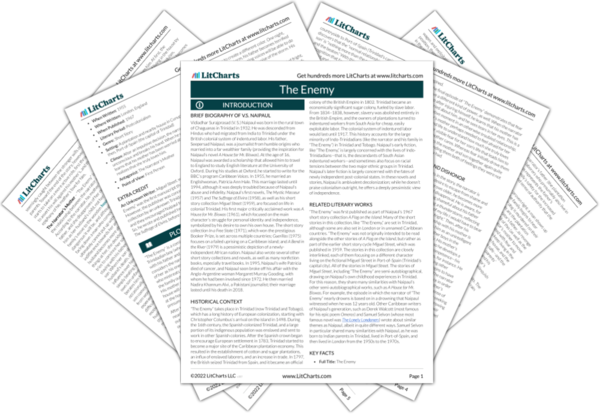At many points in the story, the narrator is motivated by a desire to escape from shame and dishonor. As he grows older, he becomes more attuned to social approval and disapproval. He is aware, for instance, that there is something shameful about his father dying (apparently of fright) during a thunderstorm, reflecting that “it appeared that for the rest of my life I would have to bear the cross of a father who died from fright.” Then, after his father’s death, the narrator’s relationship with his mother is marked by shame: in his view, she sees him as an unintelligent “freak,” comparing him unfavorably to other boys in the neighborhood and beating him frequently. His mother’s disapproval colors his view of himself, and so he develops a sense of shame about his own perceived incompetence—his inability to peel an orange or tie his own shoes, for instance. He becomes afraid of “dishonoring” himself by taking other people’s orders, especially his mother’s, so he begins to have “odd fits” where he acts out and disobeys adults. The narrator perhaps feels a need to assert his own independence in order to make up for the shame he feels because of his mother’s humiliating treatment of him and the accompanying sense of his own inadequacy. The story thus suggests that while seeking independence from one’s parents is a normal aspect of growing up, a child may become more rebellious and stubborn if their parents make them feel ashamed, since the child will then feel the need to distance themselves from shame and dishonor.
Shame and Dishonor ThemeTracker

Shame and Dishonor Quotes in The Enemy
Everybody agreed on one thing. My mother and I had to leave the country. Port-of-Spain was the safest place. There was too a lot of laughter against my father, and it appeared that for the rest of my life I would have to bear the cross of a father who died from fright. But in a month or so I had forgotten my father, and I had begun to look upon myself as the boy who had no father. It seemed natural.
In fact, when we moved to Port-of-Spain and I saw what the normal relationship between father and son was—it was nothing more than the relationship between the beater and the beaten—when I saw this I was grateful.

Unlock explanations and citation info for this and every other The Enemy quote.
Plus so much more...
Get LitCharts A+But you mustn’t get the impression that I was a saint all the time. I wasn’t. I used to have odd fits where I just couldn’t take an order from anybody, particularly my mother. I used to feel that I would dishonour myself for life if I took anybody’s orders. And life is a funny thing, really. I sometimes got these fits just when my mother was anxious to be nice to me.
Slowly the friendliness died away. It had become a struggle between two wills. I was prepared to drown rather than dishonour myself by obeying.











